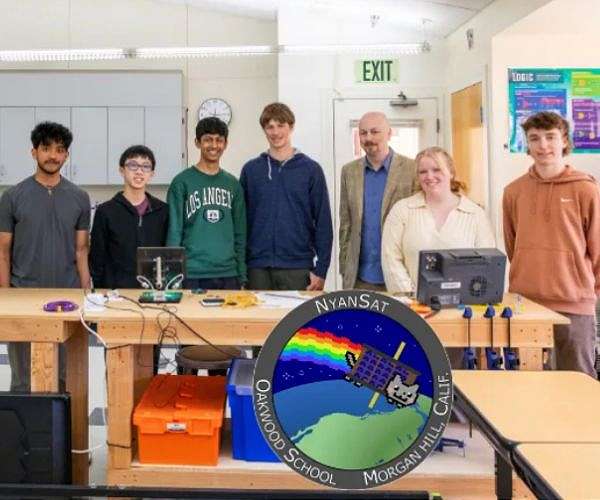CubeSats provide an affordable way to conduct scientific research and test new technologies in space.
![]()

Oakwood High School’s CubeSat class.
By Robert Airoldi

Robert Airoldi
A little bit of Morgan Hill will be going into Earth orbit, thanks to some of the students at the community’s Oakwood School. NASA announced in mid-March it has chosen 10 small research satellites, called CubeSats, from eight different states in the United States. These satellites will be sent to space to help the space agency achieve several goals: Provide more opportunities for education and science; Support the development of new technologies; and help train and develop the future workforce in the space industry.
One of the selected CubeSats is called NyanSat, which is designed and built by the K-12 private school. NyanSat will serve as an example for educational outreach and space technology development. It has several payloads that will test and demonstrate how well various new systems work in space. These include:
- An acoustic spacecraft mapping and sounding payload, which aims to simplify sensor systems in spacecraft and provide additional mission information.
- A cryptographic ledgers in space payload, which will test the possibility of using space-based digital notaries for transactions on Earth and in space.
CubeSats are small, cube-shaped satellites that follow a standard size. The basic unit, called 1U, measures 10x10x11 centimeters. CubeSats can be made bigger by combining multiple units, up to a size of 12U. Oakwood’s satellite is 2U in size.
All of Oakwood’s spacecraft engineering team is incredibly excited, said Michael Lyle, instructor of the elective class.
“The students have developed new technologies that we believe will significantly improve future space missions, and we’ve been given the opportunity to try them out in low earth orbit,” he said. “There’s been an incredible amount of effort from both current students and alumni during the past three years, but the challenge has just begun. We’re finishing the development of our satellite and preparing to operate it from our campus after it launches.”
Because CubeSats are small and inexpensive to build and launch, they make it easier for different organizations, like government agencies, companies, and universities, to work together on space projects. CubeSats also allow for quick development and provide an affordable way to conduct scientific research and test new technologies in space.
 We got word from the Better Business Bureau that email continues to be a popular avenue for scammers who want to steal personal and financial information. To trick you into clicking links and providing personal information, scammers are posing as legitimate businesses. The BBB warns consumers to be extra vigilant when receiving urgent emails from supposed businesses asking for payment information.
We got word from the Better Business Bureau that email continues to be a popular avenue for scammers who want to steal personal and financial information. To trick you into clicking links and providing personal information, scammers are posing as legitimate businesses. The BBB warns consumers to be extra vigilant when receiving urgent emails from supposed businesses asking for payment information.
How this scam works
 You receive an urgent email from a business you have a membership or an account with that states your subscription or membership has expired. It asks you to click a link to provide payment information. It may look legitimate and include the business’s logo, and you may have even received the email near the time your subscription has expired or will be expiring.
You receive an urgent email from a business you have a membership or an account with that states your subscription or membership has expired. It asks you to click a link to provide payment information. It may look legitimate and include the business’s logo, and you may have even received the email near the time your subscription has expired or will be expiring.
So, you click the link and provide your credit card information, only to learn the email and website were fake. Your card may be charged, and a scammer now has your personal and financial information.
Scammers may also email you stating your subscription has or will be auto-renewing, causing confusion and worry. They may provide a customer service phone number, which is actually fake.
How to avoid similar scams
- Take a second look at the email. There are several red flags that identify phishing emails. Look at the sender’s email address — if it’s a long string of numbers and letters that don’t make sense, or if the email address doesn’t look right, it’s likely an impostor.
- Go to the business to confirm the email. If you receive an email stating your subscription has expired or payment is needed, verify the information on your own. Call the business’s real phone number directly (don’t use any phone numbers included in the questionable email you got) and verify your account details with them.
- Keep track of any subscription or membership renewal dates and the anticipated charges on a calendar so you know when to expect them.
- Don’t provide your payment information to anyone if you did not initiate the purchase. If you’re being asked to pay with your bank account, prepaid credit cards, digital wallet apps, or wiring money, this is a red flag.
- Check with BBB Scam Tracker. If you’re questioning an email you received from a business, look up the details at www.bbb.org/scamtracker and verify if anyone else has received the same type of email. This can help you verify whether or not it is fake.)






